- Home
- J. M. Hayes
The Grey Pilgrim
The Grey Pilgrim Read online
The Grey Pilgrim
The Grey Pilgrim
J.M. Hayes
www.jmhayes-author.com
Poisoned Pen Press
Copyright © 2007 by J.M. Hayes
First U.S. Edition 2007
Library of Congress Catalog Card Number: 2007926447
ISBN: 978-1-59058-452-1 Hardcover
ISBN: 978-1-61595-087-4 Epub
All rights reserved. No part of this publication may be reproduced, stored in, or introduced into a retrieval system, or transmitted in any form, or by any means (electronic, mechanical, photocopying, recording, or otherwise) without the prior written permission of both the copyright owner and the publisher of this book.
Poisoned Pen Press
6962 E. First Ave., Ste. 103
Scottsdale, AZ 85251
www.poisonedpenpress.com
[email protected]
Dedication
For, and in memory of, my parents,
who, in spite of overwhelming evidence
to the contrary, believed their son
might amount to something
And in memory of
Don Graybill and Steve Martinez
great friends and fellow pilgrims
Epigraph
There Honour comes, a Pilgrim grey,
To bless the Turf that wraps their Clay…
—William Collins
Ode, Written in the Beginning of the Year
Contents
Dedication
Epigraph
Chapter 1
Chapter 2
Chapter 3
Chapter 4
Chapter 5
Chapter 6
Chapter 7
Chapter 8
Chapter 9
Chapter 10
Chapter 11
Chapter 12
Chapter 13
Chapter 14
Chapter 15
Chapter 16
Chapter 17
Chapter 18
Chapter 19
Chapter 20
Chapter 21
Chapter 22
Chapter 23
Chapter 24
Chapter 25
Chapter 26
Chapter 27
Chapter 28
Chapter 29
Chapter 30
Chapter 31
Chapter 32
Chapter 33
Chapter 34
Chapter 35
Chapter 36
Chapter 37
Chapter 38
Chapter 39
Chapter 40
Chapter 41
Chapter 42
Chapter 43
Chapter 44
Chapter 45
Chapter 46
Chapter 47
Chapter 48
Afterword and Acknowledgments
More from this Author
Contact Us
No Nation but Our Own
The Last Great Papago Rebellion began on Wednesday, October 16, 1940 in an insignificant village deep in the Southern Arizona desert. The place was called Stohta U’uhig, “White Bird,” though no birds of that hue were present then. The place wasn’t on any maps, except a couple produced in limited quantity for the Bureau of Indian Affairs (BIA) that failed to place it accurately anyway. It was also known as Jujul’s village because he’d been its Head Man and Priest for longer than most people could remember.
Jujul’s name was pronounced in the Spanish fashion. It sounded to English speakers like “who who’ll.”
He was standing near his adobe hut in the midst of a small crowd. His villagers were typical, curious sorts, drawn to the unusual. The unusual was present. A black automobile with a crudely painted tribal police crest on its door had brought a policeman in an ill-fitting uniform and a curiously pale man, a representative of the BIA, to White Bird.
Jujul would have liked to examine the automobile. He’d seldom been so close and had never actually touched one, but there was pressing business. Luis Azul and the fat little Gringo stood in the shade of the paloverde in front of Jujul’s home. Luis was scraping at the dust with his feet, refusing to meet Jujul’s gaze. The White Man had shed his suit coat and draped it over a pudgy arm. His collar and vest were open and his tie loose, but it wasn’t enough. He was soft, unaccustomed to heat or exertion, and he was paying for it. Perspiration soaked his clothing and mixed scents with the remnants of his floral aftershave. The result was nauseating.
The fat man looked back and forth between Luis and Jujul. He wanted to get this business over with. He said something to Luis and Luis, still refusing to look Jujul in the eye, translated again.
“Mr. Larson says I must repeat his words, and this time I must be certain you understand them. It is a simple matter, he says. You must give him the names of all your men who are between twenty- one and thirty-five years of age so that they can be registered. It is a new law which goes into effect today. Everyone must obey it, even the Gringos. Siwani Jujul, I do not think the White Men will necessarily take our people for their army. I think this is only their way of counting us so they know how valuable we will be as allies if they go to war and need our aid. Siwani, the tribal council has agreed to this. It is truly a thing which must be done.”
Jujul was tall and slender for a Papago. His face was the color and texture of fine old leather and the scar on his right temple was almost invisible beneath his thick white mane. He was an imposing figure, and since he was tall enough to look down on the White Man and his servant, the tribal policeman, his contemptuous glare was even more impressive.
“Pia’a,” Jujul told Luis. “No. Tell him I said no. He is without authority here. This is the land of the Desert People. It is not America. It is not Mexico. This place is no nation but our own. I who am Chief Medicine Man of this village, deny the right of either of you to be here, other than as our guests. We shall not take part in this registration thing. If you continue to insist on it, you will no longer be welcome among us.”
“Siwani Mahkai, I beg you, do not provoke him.” Luis replied. “This place is America. There will be trouble if you do not agree to this. The Gringos may be a crazy people, a foolish people, but they are strong. They will make you obey.”
Luis worried at the brim of his campaign hat with his dark brown hands. Jujul had seen Catholics do the same with the beads from which they hung the curious symbol of their faith. Luis was very uncomfortable.
“Tell him,” Jujul demanded.
Luis reluctantly translated, softening Jujul’s words as he did so. There was no way to soften the final answer. Jujul watched, intrigued, as the White Man slowly became a red one, his face flushing to almost the color of the skin of the Desert People where they did not expose it to the sun.
“Arrest the son of a bitch,” Larson shouted, spraying the dry wind with his spittle.
“Siwani Jujul,” Luis stuttered, “Mr. Larson says that I must arrest you.”
“And how will you do this, Luis? Unless there are a great many more of your policemen hiding in the machine that brought you, then I think you are too few. I think, also, if you draw your gun on me, Raven or Wheat Rows or another of my men will shoot you. So, tell me, how will you do this?”
Luis was suddenly more than just nervous. He was afraid.
Edward Larson was twice Jujul’s weight and half his age, and he was also irrational with rage. He came very close to taking a swing at the old man, but a second glance at the chief’s sinewy muscularity was enough to dissuade him. Instead, he ordered Luis Azul to use whatever force was necessary to take the old man into custody. Luis explained what would happen if he did anything of the sort. Larson hadn’t really noticed the other villagers up until then, and when he did, he briefly experienced a
kinship to Custer. He let Luis lead him back to the tribal police car. Since no one followed, he allowed himself the luxury of shouting threats that most of them couldn’t understand while waving his chubby fists.
Jujul and his people stood and watched quietly. The policeman maneuvered Larson into the car, got it started, and began to back down the rutted track they’d followed to the village, searching for a place that was wide enough to turn around. Everything might have been all right if Larson hadn’t felt the need for one last gesture. He stuck his fist out of the passenger’s window, aimed it at Jujul, and raised a single finger.
Jujul was not particularly familiar with the White Man’s ways, but he recognized Larson’s unexpectedly crude insult. He bent down and selected a smooth round stone. He had hurled them at cattle and predators since he was a small boy. He had used rocks to keep animals from places where they were not wanted or steer them where they were. He was very accurate with this one. The windshield in front of Larson’s startled face went suddenly opaque behind an intricate web of radiating cracks.
Jujul only threw one stone, but scores of others hailed down on the car as his villagers joined the fun. Luis Azul panicked and backed into a thicket of creosote in his hurry to point both himself and the car in the opposite direction He did not, however, panic enough to expose the driver’s side to the stone throwers.
“Stop!” Jujul shouted. “Let them leave.” It was important to him that only their pride be injured. Few of his people heard him. Fewer still obeyed. He started forward, to place himself between his people and the automobile, uncertain whether he could get there in time. The auto’s rear wheel spun, throwing its own share of rocks and gravel. The engine roared and the wheel finally grabbed hold. The vehicle lurched back onto the path, almost stalled, then sped away with a clashing of gears accompanied by the derisive jeers of his villagers.
Several of Jujul’s people understood the White Man’s tongue. They explained what Larson had promised as they watched the dust of the police car disappear toward the jagged horizon. Jujul wasn’t surprised. Even without the rocks he would have expected them to return with reinforcements. He looked at his shadow. It was mid-afternoon. He had no idea how quickly the automobile could carry its passengers back to Sells and Papago Agency Headquarters, but he had a fair idea of how long it would take to gather and organize the necessary men. A little before dawn, he decided. It would take them at least that long and they would favor that hour, being themselves normally unprepared then. It was long enough. He would be ready this time. Not like that spring in 1916 when the soldiers came because of the man named Pancho Villa.
***
The screams woke him. For a moment Jujul lay in the half dark and wondered where he was. It was not quite dawn. Magician’s Daughter, the morning star, hung where Father Sun would soon begin to burn his way up the sky.
Sleep clouded Jujul’s consciousness. He fought it, reaching out for the comforting forms of his wives beside him. They weren’t there. He rolled out of his blankets, grabbed his rifle, and scram-bled outside. He felt a sense of danger, but he couldn’t place it, couldn’t even determine whether it was real or only the remnant of some already forgotten dream.
It was very quiet. No breezes stirred the creosote. No birds called from the groves of mesquite and paloverde. The morning was unformed, waiting, breathless for that which would define it.
He heard voices. Not clear, not close. Not the pleasant tones of the Desert People or their kin, not even the liquid flow of Spanish, but harsh, clipped, nasal tones. Gringo voices! Gringos where none should be. He was too numb, too puzzled to comprehend it. Another scream tore him from further analysis, sent him dodging through the underbrush, running headlong toward the dry stream bed below their camp, toward the source of that awful cry.
It was Many Flowers who had cried out, voice full of pain and terror. Behind her wail were Cloud Peak’s outraged shouts—denial, anger! Their answer was coarse masculine laughter and a brief exchange in the White Man’s grating tongue.
They were upstream. He could hear them clearly now. They were close enough for caution, but he had none. He raced across the sand of the dry arroyo.
A slice of moon and the faint glow of false dawn gave him just enough light to see them. Too much, for the scene seared into his memory the way a glance at Father Sun burns the eye, leaving behind an image that fades only with time. Decades would prove insufficient to cleanse his mind of the agonizing incandescence of that morning.
Many Flowers lay on the sand. Her cotton shift had been torn and casually cast aside. She was pinned beneath the pale bulk of a large, half-naked White Man, his breeches bunched below his knees. Two others knelt beside them, holding her arms and legs while his pallid buttocks pumped at her. Another pair fought with Cloud Peak across the stream bed. She struggled to rake fingernails across their eyes and reach them with her teeth. They were American soldiers. Though he had not seen it often, he recognized their uniform.
He added his own cry to those of his women as he raised his rifle to begin killing them. Only there were more among the trees, not many, but he hadn’t noticed them before. One shouted something, probably a warning to his fellows, just as Jujul fired. The old Sharps bucked and threw up a spray of gravel beside the half-naked one, showering him and his companions with stinging debris. Jujul shouldn’t have missed at that range, wouldn’t have but for the shout. He frantically dug another cartridge from his pouch as the night lit up with muzzle flashes and their thin crackle rolled about him. Bullets swarmed like angry wasps. He found a cartridge, extracted the spent round and rammed the fresh one home.
He should have dived for cover, or maybe charged them, hoping they might panic and run, but he wasn’t quite sane then. The big one had climbed off Many Flowers, his erection wilting as he looked down the muzzle of the Sharps. Many Flowers was still partially held, though she swatted at her enemies with a free arm and kicked with a foot. Cloud Peak had broken free. Her captors were too busy reaching for side arms to worry about reclaiming their prize. They drew and aimed as she launched herself toward the men who held Many Flowers. Her breast exploded as the short one’s pistol fired, spraying them with her blood as she crumpled to the sand. Jujul swung the Sharps and centered it on the killer’s chest, pulled the trigger, then watched him somersault backwards as the huge lead slug propelled his remains into the brush.
Something bit Jujul on the hip. It should have been sharply painful, but the wound went almost unnoticed. He was too consumed with grief and rage. He dug for another cartridge but the Sharps was torn from his grasp as one of the Gringos’ bullets struck it and whined away. He found his knife and started toward them. The ones under the trees were too far for their hand guns to be accurate. It was why he still lived. But the big one, the half-naked one, was relatively close. He chose that one, knowing exactly what he would do to him with the knife. He went for the giant until his left leg stopped working and he found himself face down in the sand. He couldn’t rise, so he crawled on, dragging the useless leg behind him, unaware of the slug that had torn away so much muscle from his thigh. He would teach the man what it cost to violate his women. He would teach them all, one by one.
Instead, the sun rose. Not in the Eastern sky where he should, but behind Jujul’s eyes. Father Sun carried him away, took him to the Spirit World, where he dreamed sad, angry dreams of incalculable loss.
Cavalry to the Rescue
Jesus was driving because he knew the way and because, by the time they’d found Fitzpatrick, he wasn’t in the best of shape for it. Tom Edgar poured for his party guests with a heavy hand and J.D. Fitzpatrick was not a man to refuse that particular form of hospitality.
The Ford bucked and complained as they bounced along the desolate trail that led to Stohta U’uhig. It echoed the unhappiness J.D. felt at finding himself lurching across the Papago Indian Reservation. He was having one of those bad mornings after. If he’d happened across a temperance meeting about then, he would have signed
the pledge and given his undying loyalty to the cause, until chance placed a little hair of the dog in his path.
They snaked up a steep, rounded hill, the Ford moaning in low gear. J.D. only just managed to avoid joining it. The sun was still climbing the empty vault of sky but it was already like an oven, October or not. J.D. should have been grateful for how quickly he was sweating out the poisons, but he wasn’t in the mood for grateful.
A miasma of heat waves obscured the horizon and provided a shimmering lake in the southeast that wasn’t really there. J.D. watched the road unwind and tried not to think about how his head and stomach felt or how long it would be before he could get some sleep. Heavy is the head that wears the badge, he paraphrased to himself, apropos of nothing. Actually, his Deputy United States Marshal’s badge was pinned to the inside of the jacket he’d tossed on the back seat when he gave up trying to use it as a pillow. It lay beside the fedora he usually wore, which, this morning, felt a few sizes smaller than usual.
The Ford finally crested the hill. As they started down its backside, J.D. spotted something ahead. He told Jesus to stop the car and he did, locking all four wheels in a shower of dust and gravel that left them broadside in the so-called road.
It was clear that Deputy Sheriff Jesus Gonzales didn’t care for chauffeuring White Men around Pima County. He had developed a simple strategy to avoid the task. Whenever he was placed behind the wheel he drove without restraint. Stop meant foot to the floor, go just put the foot on a different pedal. It probably would have worked on J.D. if he hadn’t been too miserable to complain, much less navigate for himself.
The door stuck when J.D. tried to let himself out and he had to shoulder it open. The effort made his head hurt worse but was strangely satisfying just the same. He stepped out onto the road. It was even hotter in the sun, but after hours of rattling and swaying in the confines of the Ford, the parched quiet of the desert was as welcome as a cold drink.
A grey-green forest stretched between jagged volcanic peaks. Up close, it wasn’t an impressive forest. Its leafy canopy was sparse and seldom rose above head high, though thick saguaros and the spiked whips of ocotillo branches rose considerably farther. The forest’s floor was covered with occasional clumps of grass and a myriad of sharp things, thorned and needled, protruding from a soil that was not much duller. The ground seemed equal parts sand, sharp gravel, broken rock, and dust. Teddy bears peered out of those woods, their soft, cuddly forms just one more desert mirage. These were cholla cactuses and their deceptive fur nothing but a pelt of wicked spines. Not a friendly landscape, J.D. decided. On his better days he appreciated its stark beauty for that very reason.

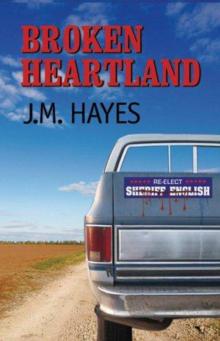 Broken Heartland
Broken Heartland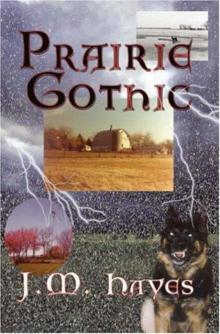 Prairie Gothic
Prairie Gothic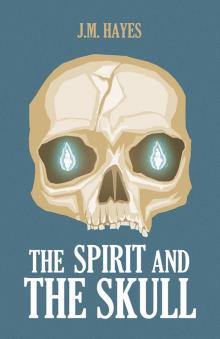 Spirit and the Skull
Spirit and the Skull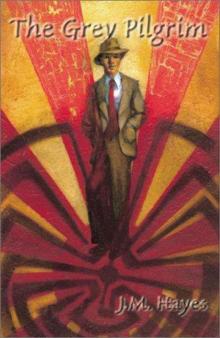 The Grey Pilgrim
The Grey Pilgrim Plains Crazy
Plains Crazy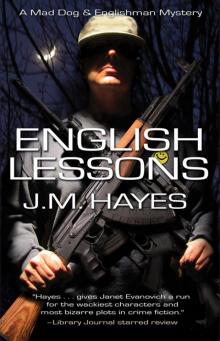 English Lessons
English Lessons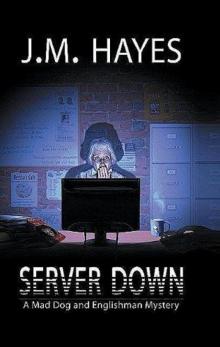 Server Down
Server Down